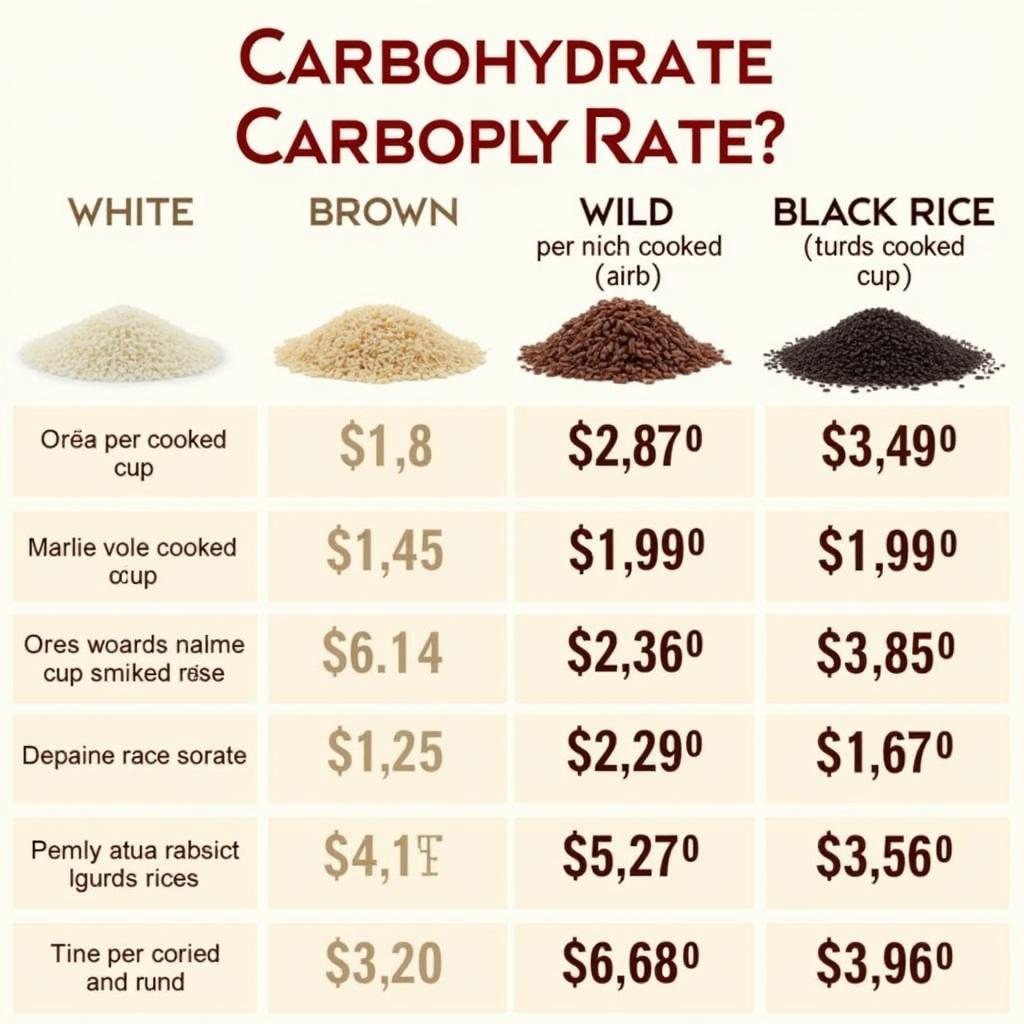Rice, a staple food across the globe, is a delicious and versatile grain. However, for those watching their carbohydrate intake, understanding the carb content of rice is crucial. So, how much carbs in a cup of cooked rice? The answer isn’t always straightforward, as it depends on the type of rice.
Different rice varieties have varying nutritional profiles. White rice, often preferred for its texture and ease of cooking, generally contains more carbohydrates than its brown counterpart. This difference stems from the processing methods. Brown rice retains its bran and germ layers, which are rich in fiber, lowering the overall digestible carbohydrate content. White rice, on the other hand, has these layers removed, resulting in a higher concentration of carbohydrates. Knowing this distinction is key for anyone managing their carbohydrate intake, especially those with specific dietary needs like diabetes management.
Decoding the Carb Content of Different Rice Varieties
Let’s delve deeper into the carbohydrate content of specific rice types. A typical serving size of one cup of cooked white rice contains approximately 45-50 grams of carbohydrates. This amount can fluctuate slightly depending on the specific variety and cooking method. 1 cup of brown rice carbs generally contains around 40-45 grams of carbs, a slightly lower amount compared to white rice. This difference, while seemingly small, can be significant for individuals closely monitoring their carb intake.
Other rice varieties, such as wild rice and black rice, offer even more nuanced carbohydrate profiles. Wild rice, technically a seed, boasts a lower carbohydrate content, usually around 35 grams per cooked cup. Black rice, known for its rich antioxidant properties, falls within a similar range. Understanding these differences allows for informed choices when incorporating rice into a balanced diet.
How Cooking Affects Carb Content
The way you cook your rice can subtly influence its carb content. Overcooked rice, for example, tends to have a higher glycemic index (GI), meaning it can cause a more rapid rise in blood sugar levels. This is important to consider for individuals with diabetes or those aiming for stable blood sugar control. Cooking rice al dente can help mitigate this effect, as it preserves some of the resistant starch, which is less readily digested.
Incorporating Rice into a Balanced Diet
Despite its carb content, rice can be part of a healthy diet. Choosing whole-grain options like brown rice provides added fiber, which aids digestion and promotes satiety. Combining rice with protein and vegetables creates a balanced meal that helps regulate blood sugar levels and provides sustained energy. Portion control is also essential. Sticking to recommended serving sizes ensures you’re getting the nutritional benefits of rice without overdoing the carbohydrates.
Expert Opinion: Dr. Anna Nguyen, Registered Dietitian, states, “Rice can be a valuable source of energy and nutrients, especially when consumed as part of a balanced diet. Choosing whole-grain options and practicing portion control are key for maximizing its health benefits.”
Conclusion
Understanding the carb content in a cup of cooked rice is crucial for maintaining a healthy diet. While the amount varies depending on the type and cooking method, making informed choices empowers you to enjoy this versatile grain while managing your carbohydrate intake effectively. Remember to prioritize whole-grain options and incorporate rice into balanced meals for optimal health.
FAQ
- Is brown rice healthier than white rice?
- How can I reduce the carb content of rice?
- What are the health benefits of wild rice?
- How does the glycemic index of rice affect blood sugar?
- Can I eat rice if I’m on a low-carb diet?
- What are some healthy ways to cook rice?
- How much rice should I eat per serving?
Situations Where This Information Is Needed:
- Diabetes Management: Individuals with diabetes need to carefully monitor their carbohydrate intake to manage their blood sugar levels. Knowing the carb content of rice is essential for meal planning.
- Weight Management: Those watching their weight often track their calorie and macronutrient intake, including carbohydrates. Understanding the carb content of rice can help them make informed dietary choices.
- Athletic Performance: Athletes may adjust their carbohydrate intake based on their training needs. Knowing the carb content of rice can help them fuel their workouts and recovery.
- Specific Diets: Individuals following low-carb or ketogenic diets need to strictly limit their carbohydrate consumption. This information is crucial for determining whether rice fits into their dietary plan.
Related Questions and Articles:
- How many calories are in a cup of cooked rice?
- What are the nutritional benefits of different types of rice?
- Rice recipes for a healthy diet
Khi cần hỗ trợ hãy liên hệ Số Điện Thoại: 0372999996, Email: [email protected] Hoặc đến địa chỉ: 236 Cầu Giấy, Hà Nội. Chúng tôi có đội ngũ chăm sóc khách hàng 24/7.

